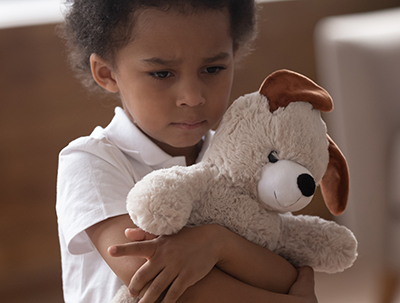Helping Children Cope
Helping Children Cope
 Understanding how children grieve and knowing what to say can be difficult. The thoughts below are a good starting place when supporting children in grief and the resources provide specific information and support as you navigate hard conversations with children.
Understanding how children grieve and knowing what to say can be difficult. The thoughts below are a good starting place when supporting children in grief and the resources provide specific information and support as you navigate hard conversations with children.
- Be Open and Honest – Children often know more than we give them credit for. Being open and honest with your child fosters trust and opens the door for understanding.
- Every Child Grieves Differently – Some children are full of questions while others withdraw. Children may show little immediate grief and will appear to have moved on only to return to their grief at unexpected times and in unexpected ways. Be prepared for intermittent bursts of grief from children.
- Children are Forward Looking – As parents we often look to the past and what was. Children grieve but are much quicker to look at the future and all that lies ahead for them. This forward looking does not mean they are not grieving. Their grief is different than yours.
- You Won’t Have All the Answers – Sometimes you won’t know what to say or have a satisfying answer to a tough question. This is a good time to turn the question back to the child and ask “What do you think about this?” or "Is this something you are worried about?" Your child's answer may reveal fears or hopes that are on the child’s mind.
- Words Matter – Many parents are hesitant to say the words "dying" and "dead." While these terms may be uncomfortable for adults to say, young children can be confused by vague terms like "in a better place" or "went away." Young children need a concrete understanding of death.
- Elevated Emotions – Children who are grieving often do not understand their emotions. Feelings can be expressed as shouting, feeling angry or being disruptive. Reassure your child that they are loved and will continue to be cared for no matter how they are acting or feeling.
- Get Support – If you are worried about your child(ren) and need additional support, reach out to family members, your pediatrician, child-life specialists, and support groups. You are not alone as you support your surviving children.
Resources for Families & Staff
- What Do I Tell the Children?, español - ¿Qué les digo a mis hijos?
- Should I Bring the Children to Say Goodbye?, español - ¿Debería llevar a los niños a despedirse?
- Helping Children Say Goodbye from Afar, español - Ayudar a los niños a despedirse desde lejos
- Explaining Cremation, Burial, Calling Hours & Funeral, español - Explicar la cremación, el entierró, la visitación y el funeral
- Talking with Children about Cancer, español - Hablar con los niños sobre el cáncer
Age Specific Support for Grieving Children
- Supporting a Grieving Infant (0-12 months), español - Bebés (desde el nacimiento hasta los 12 meses de vida)
- Supporting a Grieving Toddler (1-2 years), español - Niños pequeños que comienzan a caminar (de 1 a 2 años)
- Supporting a Grieving Preschooler (3-5 years), español - Preescolares (de 3 a 5 años)
- Supporting a Grieving School Age Child (6-12 years), español - Niños en edad escolar (de 6 a 12 años)
- Supporting a Grieving Teenager (13+ years), español - Adolescentes (desde los 13 años)
- Navigating Grief and Loss as a College Student